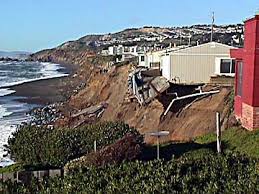Pacifica Tribune/"My Turn" guest column, 7/27/12. "Differences of opinion in Pacifica" by Paul Slavin
 |
| Grey houses fall into the Pacific Ocean too |
"In his "My Turn"
article last week, Sam Casillas issued an impassioned plea for the
status quo, backed with some convoluted reasoning that he believed
justified "Why our environment should be our economy." Mr. Casillas is a
longtime environmental activist and a Pedro Point community organizer.
In his guest column he presented what might be kindly called a
revisionist history of Pacifica, one that may be compatible with his
environmental theories but varies greatly from accepted historical fact.
He stated, for instance, that Pacifica "was founded on the principle of
a family-based community that lives in harmony with the beauty of the
surrounding environment which encompasses emerald hills falling into the
majestic Pacific Ocean." While that might be poetically impressive, it
is factually nonsense. If there are some "founding principles" of
Pacifica, I'd like to see them.
 |
| Our economy could be our pet Zebra |
Pacifica
was, in fact, founded by all sorts of people. Some certainly loved the
natural beauty of our unique coastside setting. Many others loved the
opportunity to leave rented apartments in crowded, dirty cities and
purchase their own, affordable homes in new, suburban neighborhoods. In
Mr. Casillas's version of our history, this merely "contributed to the
blight of strip malls and tract housing which dominate the American
landscape to this day." Apparently not many of the new residents found a
place on Pedro Point, and the poor slobs had to settle for the
cookie-cutter homes in Linda
Mar.
We should understand
that Sam Casillas has a well-honed vision of what he wants to see
happen around here, and that does not include new housing, or any new
development for that matter. He defends his anti- housing position with
the old and much-contested argument that single-family houses cost the
local government more in services than they make in taxes. I've heard
both sides of this debate before and still don't have a definitive
answer (if there is one). You'd be amazed at the number of studies the
question has generated, with different studies supporting every possible
aspect of the debate, pro and con. In Mr. Casillas's article he quoted
(rather disingenuously) a report prepared by the Trust for Public
Lands, a conservation group dedicated to securing property so that it
cannot be developed. Its conclusions were what you might expect.
But
with the way that conditions, costs and taxes can vary from place to
place, I doubt if any of these studies are of any value outside of their
immediate locale. So, for the sake of argument, let's say that Mr.
Casillas is correct: Pacifica homes cost more in services than they pay
in taxes. OK. Now, I know this is a ridiculous over-simplification of an
incredibly complex problem, but, just conceptually, how about we
either, (A), reduce the cost of services per household or, (B), raise
their taxes. My preference would be (A), but the point is we can't go on
losing money. Nor should we stop building houses. I'll leave the
details for staff to work out.
 |
| Have you heard we have frogs? |
One thing that I'm
sure Sam Casillas and I, along with everyone else in town, would agree
on is that Pacifica needs additional, dependable income. But Mr.
Casillas insists there is only one way to get it: "transform our economy
into a visitor-based economy that capitalizes on... our open space." In
other words, "Our environment is our economy." He continues, "The
tourists that come to hike in the Pedro Point Headlands and take in the
views from Devil's Slide will be the ones who add to the revenue base".
Is it necessary to point out that we've been waiting for those
deep-pocketed eco-tourists for years? Years! And that this policy of
encouraging environmental tourism at the expense of development and
business is largely responsible for the hole we're in today. Mr.
Casillas claims his policies will create a "vibrant economy based on our
environmental assets," but admits we "must find a way to keep the
tourists here." That's always been the problem: how to make any money
off the hikers and bikers and surfers, and apparently Mr. Casillas
doesn't have any more of an idea than anybody else.
The
environment is our economy" is a thoroughly discredited financial
policy. It hasn't worked in the past and shows no signs of working in
the future.
It's obvious our economy must be diversified, with
the environment playing an important part, but one part among many.
Business must be better represented. Development interests must be heard
and fairly evaluated. We have to open up our thinking, our planning to
new people with new ideas, not confine ourselves to the daydreams of
some diehard extremists."
Reference - Pacifica Tribune, 7/27/12,
"My Turn" guest column, by Samuel Casillas. "Our environment should be
our economy." Reprint on Fix Pacifica as "Searching for our economy."
Posted by Kathy Meeh


No comments:
Post a Comment